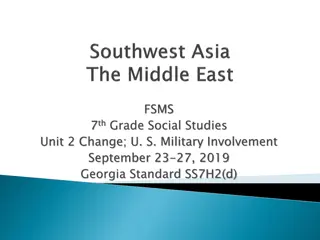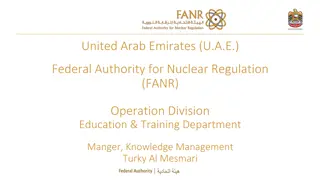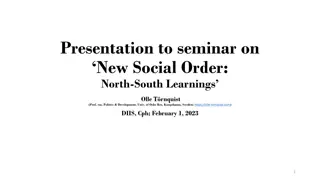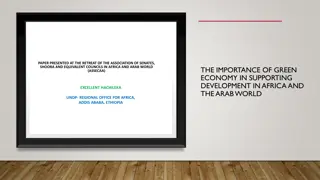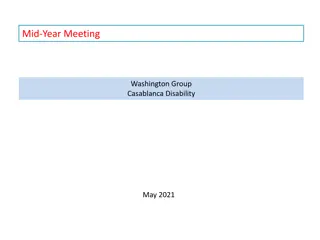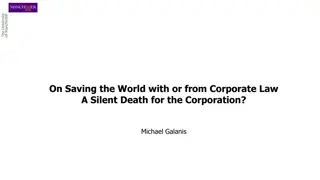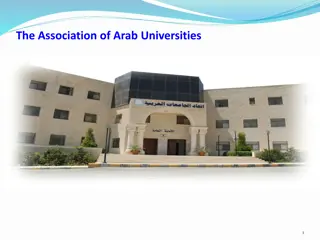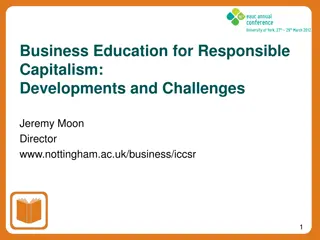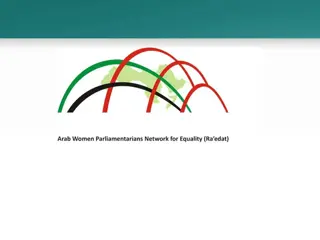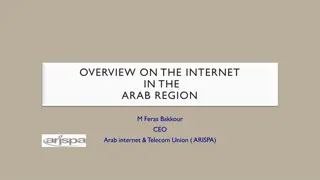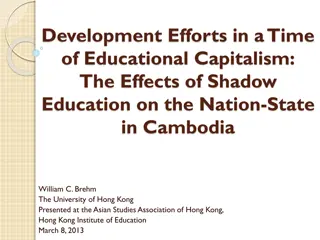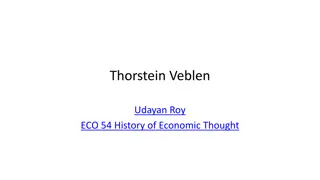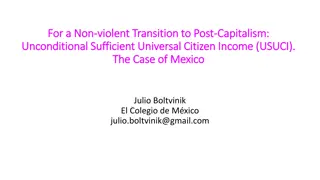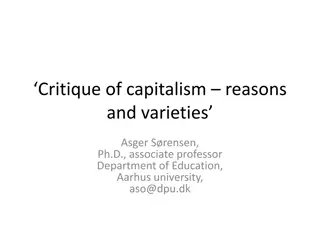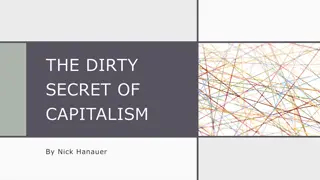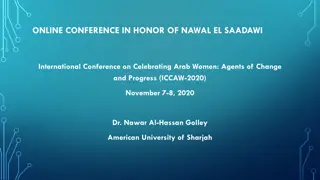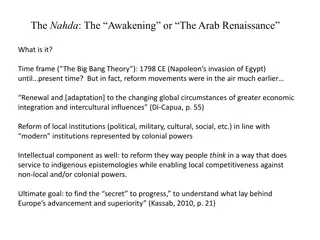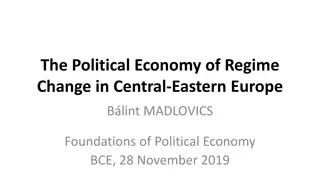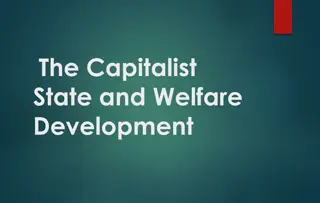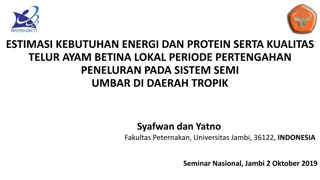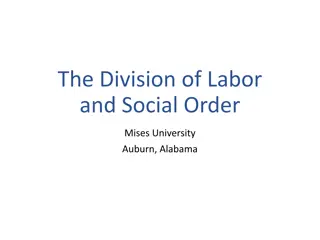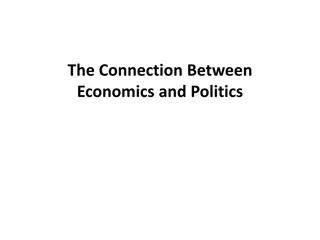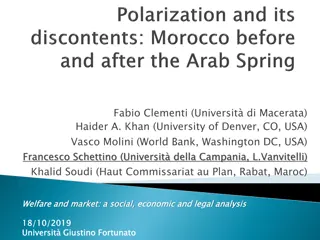Celebrating Arab American Heritage: Culture, Diversity, and Contributions
Explore the rich heritage of Arab Americans, encompassing a diverse group with roots in 22 Arab countries across Northern Africa to Western Asia. Discover their language, culture, and significant contributions to American society. Learn about Arab American Heritage Month and educational resources to
0 views • 8 slides
Debate Framework for Capitalism vs. Communism
This debate framework presents a structured approach for arguing in favor of or against the motion that capitalism is superior to communism. It includes sections such as introduction, statement of the motion, definitions, and criteria or principles to guide the debate. Emphasis is placed on developi
0 views • 9 slides
Insights Into 'An Inspector Calls' Characters
In "An Inspector Calls," the Inspector represents socialism, with an air of solidity and omniscience. He delivers a warning about mankind needing to change and accept responsibility. Mr. Birling, on the other hand, embodies capitalism, shown as unlikeable and out of touch. The play critiques Birling
0 views • 7 slides
Marxism and Capitalism
Marxism is a body of social, political, and economic thought derived from the works of Karl Marx and Friedrich Engels, focusing on the analysis of capitalism. Capitalism is an economic system where private individuals own goods and services based on market supply and demand. The purest form of capit
0 views • 25 slides
Insiders and Outsiders in Arab Political Economies
Examining core Arab countries outside the Gulf, this analysis delves into the unique features of Arab capitalism, highlighting low state capacity, heavy regulation, and segmented labor markets. State intervention plays a crucial role in creating insiders and outsiders, shaping a landscape of low ski
1 views • 56 slides
Capitalism, Modernism, and Postmodernism in Literature
Terry Eagleton's essay delves into the impact of capitalism on art and literature, exploring the emergence of modern and postmodern literature in the capitalist and late capitalist eras. He discusses how late capitalism influences art with characteristics like mass consumerism and virtual reality. P
3 views • 7 slides
U.S. Military Involvement in Southwest Asia: Analyzing Historical Continuity and Change
This unit covers the influence of the U.S. in Southwest Asia and explores events such as the Persian Gulf conflict, invasions of Afghanistan and Iraq. Students will examine the establishment of the modern State of Israel, including historical reasons like Jewish religious ties, the Holocaust, anti-S
5 views • 37 slides
Overview of United Arab Emirates Federal Authority for Nuclear Regulation (FANR) Operations Division Education & Training
The United Arab Emirates Federal Authority for Nuclear Regulation (FANR) Operation Division's Education & Training Department is led by Turky Al Mesmari. They focus on capacity building, nuclear safety, and strategic goals to ensure peaceful, safe, and secure use of nuclear energy. The department ai
3 views • 12 slides
Social Democratic Politics: Pillars and Strategies for Transformation
Social democratic politics is rooted in democratic collectivities and rights, aiming to reshape capitalism through reform, regulation, and transformative strategies. Olle Törnquist delves into the historical foundations and the need for comprehensive reforms to challenge the dominant logics of capi
3 views • 10 slides
Life in Auranitis, Jebel Arab Trachonitis, and Leja Batanaea
Auranitis, Jebel Arab Trachonitis, and Leja Batanaea were regions with main cities like Canatha, Adraa, and Bostra. The villages in these areas had no formal plans, with houses similar to those in Dead Cities, featuring storage downstairs, courtyards, flat roofs, and internal staircases. Villagers m
0 views • 12 slides
Challenges and Opportunities: Green Economy Impact in Africa and Arab World
The paper presented at the ASSECAA retreat highlights the importance of the green economy in supporting development in Africa and the Arab world amidst the global economic crisis. It discusses challenges such as slow recovery from COVID-19, geopolitical instability, and climate change effects, empha
1 views • 30 slides
Enhancing Disability Statistics in the Arab Region: The Casa Group Initiative
The Casa Group for Disability Statistics in the Arab Countries was established to improve data collection on disability by encouraging the use of standardized tools and developing comparable indicators. Through various meetings and publications, the group aims to build capacity among statisticians,
0 views • 5 slides
The Role of Corporate Law in Wealth Distribution and Capitalism
Exploring the evolution of corporations within capitalist frameworks, this analysis delves into the intertwined concepts of managerialism, infinite wealth accumulation, and the social-historical embeddedness of corporations. Through historical contexts and theoretical perspectives, the discussion de
0 views • 17 slides
The Association of Arab Universities: Promoting Higher Education Cooperation
The Association of Arab Universities (AARU) is a non-governmental organization established in 1964 with the mission to assist Arab universities in preparing capable graduates to serve their communities and preserve cultural heritage. With 260 member universities, AARU aims to enhance cooperation, pr
0 views • 52 slides
Perception of Security in Arab Countries: Analysis and Comparison
This research study delves into the perception of security in Arab countries, focusing on personal, community, and national dimensions. The study aims to understand the factors influencing security perceptions through indexes and surveys conducted in Spain and the Arab world. By comparing data from
2 views • 13 slides
Evolving Trends in Business Education for Responsible Capitalism
Explore the developments and challenges in business education for responsible capitalism, focusing on the role of business schools, a decade of progress in programs and research, and analysis of UN PRME signatory reports. Discover how sustainability-related research and learning offerings are shapin
0 views • 25 slides
The UN Partition Plan and International Law in Relation to Resolution 181 by Harshika Gupta
The United Nations Resolution 181, passed in 1947, recommended the partition of Palestine into Arab and Jewish states. This plan, which led to conflict and violence, was considered a legal basis for the establishment of Israel. The resolution addressed the competing claims of Jews and Arabs over Bri
1 views • 15 slides
Challenges and Opportunities for Arab Women in Sustainable Development
Arab women face numerous challenges in achieving full participation in sustainable development, as highlighted by the gender gap in various areas such as poverty, education, and access to resources. Empowering women and achieving gender equality are crucial for driving sustainable solutions to envir
0 views • 25 slides
Internet Overview in the Arab Region by ARISPA
The Arab Internet & Telecom Union (ARISPA) provides a detailed overview of internet penetration rates in the Arab region, focusing on global and regional comparisons, as well as the future IPv4 situation. Founded in 2006, ARISPA works under the Arab Economic Union Council, with 20 members representi
0 views • 17 slides
Shadow Education and Educational Capitalism in Cambodia
Exploring the impact of shadow education on the nation-state in Cambodia, this analysis delves into the complex interplay between educational development, compulsory schooling, privatization practices, and the emergence of educational capitalism. It questions the traditional notions of nation-state
0 views • 8 slides
Queer Art Beyond Identity Politics: Exploring Capitalism, Gentrification, and LGBT+ Inequalities
Explore the complex intersections of capitalism, gentrification, and LGBT+ identities through the lens of queer art and community activism. Unpack the nuances of human capital theory, dominance of middle-class white gay men, and challenges faced by people of color within the LGBT+ community. Contemp
0 views • 13 slides
Thorstein Veblen: Critic of Capitalism and Founder of American Institutionalism
Thorstein Veblen, a key figure in the history of economic thought, criticized capitalism for its rough and monopolistic nature. He founded the American Institutionalism School and challenged neoclassical economics' view of rational consumer behavior and business motivations. Veblen's analysis focuse
0 views • 23 slides
Child Poverty in the Arab Region: Insights from the Arab Multidimensional Poverty Reports
The Arab Multidimensional Poverty Reports shed light on child poverty, emphasizing the importance of focusing on children's well-being alongside household-level measurements. The reports utilize the Arab-MODA framework to measure child poverty, assessing various dimensions such as health, education,
0 views • 19 slides
Transition to Post-Capitalism: Unconditional Citizen Income in Mexico
Unstoppable technology advancements in capitalism lead to the replacement of human labor, creating an insufficient wage-labor income link. The concept of an Objective Limit of Capitalism (OLC) suggests that the need to exploit human labor will diminish as science progresses, highlighting the necessi
0 views • 7 slides
Critique of Capitalism: Reasons and Varieties by Asger Sørensen, Ph.D.
Asger Sørensen, Ph.D., delves into the critique of capitalism, exploring various perspectives such as political contestation, economic analysis, and value assessment. Through historical contexts and theoretical frameworks, Sørensen raises fundamental questions about capitalism's impact on freedom,
0 views • 10 slides
Unveiling the Dirty Secrets of Capitalism by Nick Hanauer
Nick Hanauer, a successful capitalist, sheds light on the flaws of capitalism and neoliberal economic theory, emphasizing the need for regulatory changes to benefit the majority. He challenges the assumptions of market capitalism and advocates for a new economic approach focused on cooperation and s
1 views • 25 slides
Celebrating Nawal El Saadawi: International Conference Honoring Arab Women
Join the ICCAW-2020 conference on celebrating Arab women, honoring the fearless feminist Nawal El Saadawi. Explore her life, activism, and struggle against gender, class, and political oppressions. Engage with discussions on her impact as a role model for Arab and non-Arab women worldwide.
0 views • 25 slides
Emerging Trends in Arab Renaissance and the Evolution of Arabic Literature
The Nahda, or Arab Renaissance, initiated in the late 18th century, marked a period of reform and adaptation in Arab societies, aiming to align with modern institutions and promote intellectual advancement. This movement sought to embrace progress, foster rationality, and understand civilization's r
0 views • 5 slides
A Brief History of Communism: From Capitalism to Karl Marx's Vision
The history of communism traces back to the capitalist system's exploitation of workers in the mid-1800s. Karl Marx's vision, outlined in "The Manifesto of the Communist Party," aimed for economic equality and worldwide revolution. The inherent flaws of capitalism were critiqued, leading to the rise
0 views • 17 slides
The Political Economy of Regime Change in Central-Eastern Europe
The content discusses the concepts of socialism and capitalism, exploring various models and transitions from socialism to capitalism. It focuses on regime changes in Central and Eastern Europe, with case studies on Poland and Hungary. The text covers different varieties of socialism and their econo
0 views • 21 slides
Evolution of Capitalism and Welfare Development
Earnest Mandel identified three types of capitalism - industrial, entrepreneurial, and corporate - each influencing welfare development differently. Industrial capitalism lacked state welfare, while entrepreneurial capitalism introduced social security measures. Corporate capitalism necessitated sta
0 views • 10 slides
Estimasi Kebutuhan Energi dan Protein Ayam Arab Periode Pertengahan Peneluran
Ayam lokal memiliki potensi untuk menghasilkan daging dan telur. Perbaikan dalam produksi telur ayam dilakukan dengan intensif dalam pemeliharaan dan peningkatan energi serta protein. Pada periode peneluran pertengahan, dilakukan penghitungan kebutuhan protein dan energi serta evaluasi produksi dan
0 views • 18 slides
The Division of Labor and Social Order in Capitalism
In capitalism, conflict is viewed as an essential component of social relations, leading to increased productivity and unity among individuals. The division of labor promotes specialization and efficiency in production, ultimately benefiting society as a whole. Comparative advantages and opportunity
0 views • 16 slides
The Interplay of Economics and Politics: A Comprehensive Analysis
Explore the intricate relationship between economics and politics, delving into the evolution of capitalism, the necessity of private property rights, challenges in establishing capitalism in certain countries, and the complex dynamics between capitalism and democracy. The discussion highlights the
0 views • 9 slides
China's Bureaucratic Capitalism and State-Directed Economy
China's approach to capitalism under Deng's reform embodies state-directed capitalism, characterized by central control over economic reforms while maintaining a non-democratic political system. This model has led to the rise of a bureaucratic capitalist regime with state-backed companies dominating
0 views • 11 slides
Social and Economic Analysis of Welfare and Market: A Comparative Study
This study delves into the social, economic, and legal aspects of welfare and market dynamics through a comparative analysis conducted by a group of researchers from different institutes. The research explores issues of generalized dissatisfaction, inequality trends, polarization, and conflict in th
0 views • 28 slides
Analyzing Middle East Conflicts: Land, Religion, & U.S. Presence in 21st Century
Delve into the ongoing conflicts in the Middle East, driven by land disputes, religious tensions, and U.S. involvement, from the Arab-Israeli Wars to the present day. Explore key terms like Arab-Israeli Wars, Camp David Accords, Intifada, Palestinians, P.L.O., and Refugee.
0 views • 24 slides
REGIONAL AND GLOBAL COMPARATIVE ANALYSIS OF INFORMATION SOCIETY IN THE ARAB REGION
The analysis highlights the progress and challenges in building the information society in the Arab region based on data from 2013. It discusses efforts to bridge the digital divide, increase ICT adoption, improve confidence in ICT use, and address various issues hindering Information Society develo
0 views • 10 slides
Impact of Arab Spring on Right-Wing Politics
Investigations on how the Arab Spring influenced right-wing politics in Germany, analyzing the nuances and consequences of this intersection. Topics include migration, social change, women's liberation, and cultural influences in different time periods.
0 views • 78 slides
Arab Literature Evolution: Crisis of Ideology and Literary Fragmentation
Changes in creative activity in the Arab world have coincided with a crisis of ideology and authority, leading to a shift towards personal, anti-ideological art forms that embrace multiplicity and marginalized discourses. This evolution is reflected in postmodern Arabic literature, with a move away
0 views • 5 slides






